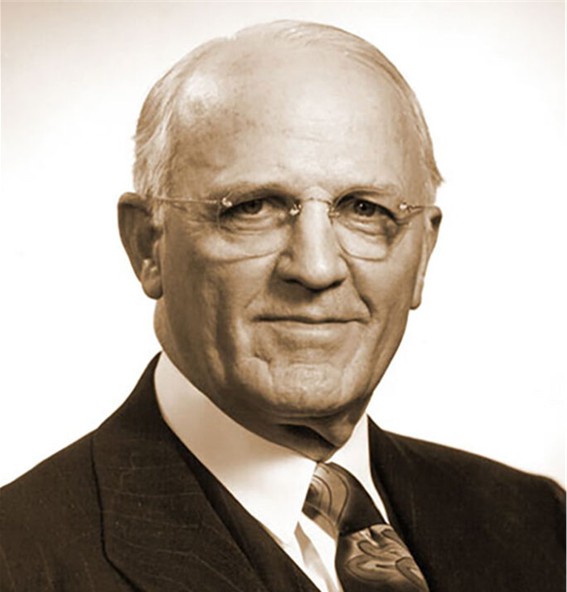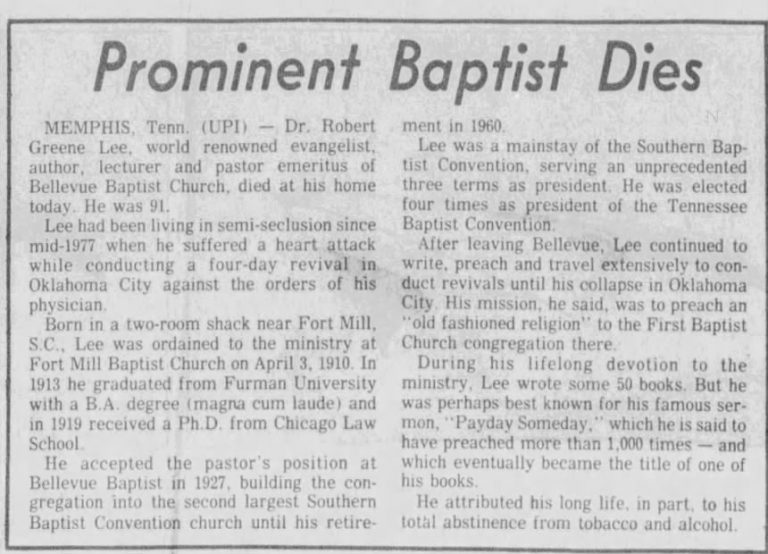Robert Greene Lee
“Revival will come… if all the sleeping folk will wake up, if all the lukewarm folk will fire up, if all the dishonest folk will confess up… Then we can have a revival!”
(Robert Greene Lee)
Early Life and Calling
Robert Greene Lee was born on November 11, 1886, in York County, South Carolina, into a humble farming (sharecropper) family. His parents were deeply religious, and from an early age Lee felt the call to preach. Baptized at age 12 at his home church in Fort Mill, South Carolina, he discovered a deep conviction for ministry.
Though his early schooling was modest, Lee displayed exceptional academic and oratorical gifts. He attended Furman University, graduating with an A.B. degree in 1913. Later he did postgraduate work at the University of Chicago (Law School) where he earned a Ph.D. in international law in 1919. Lee was ordained in 1910 at his childhood church. His early years of ministry included pastorates in South Carolina: Edgefield, first; then Chester; a move to New Orleans, Louisiana; and later to Charleston’s Citadel Square Baptist Church.
Pastorship of Bellevue Baptist Church
In December 1927, Lee accepted the pastorate of Bellevue Baptist Church in Memphis, Tennessee—a key appointment that would define his public ministry. At the time he arrived the church had about 1,430 members. Under his leadership, the congregation grew substantially; by his retirement in 1960, membership had grown to about 9,200, making it the largest Baptist church east of the Mississippi at the time.
Lee’s preaching was known for its vivid imagery, doctrinal clarity and evangelistic passion. His signature sermon, “Payday—Someday”, captured his compelling style: a message about future accountability, judgment and the grace of Christ. He preached it more than 1,200 times across the United States and internationally. During his Bellevue tenure, over 24,000 people joined the church and more than 7,600 were baptized. He served the church for over three decades (1927-1960) before retiring from the senior pastorate.
Denominational Leadership and Writing
Beyond local church ministry, Lee held significant roles in denominational life. He served three consecutive terms as president of the Southern Baptist Convention (SBC) from 1949 to 1951. He was also active on boards such as trustees of Union University in Tennessee, and in other institutional capacities.
As an author and preacher, Lee produced numerous sermon collections and books—his messages were published and widely circulated. His preaching style made him a national figure in mid-20th-century American evangelicalism.
Character, Convictions, and Influence
Robert G. Lee was characterized by a blend of scholarly discipline (given his Ph.D. background), evangelistic urgency, and a deep pastoral heart. His convictions included:
- The authority of Scripture and the urgency of personal salvation.
- A clear call to evangelism and church growth, without sacrificing doctrinal fidelity.
- A belief in large-scale ministry paired with personal pastoral care.
He also embodied the idea that humble beginnings do not hinder great impact. From a sharecropper’s son working the farm to a pastor of one of America’s growing churches, Lee’s story encouraged many.
Legacy and Impact
When Lee passed away on July 20, 1978, in Memphis, Tennessee, he left behind a broad and enduring legacy. Key aspects of his influence include:
- Church Growth Model – His three-decade leadership at Bellevue shows how a pastor can lead steady growth without compromising conviction. The model of evangelistic preaching, disciplined discipleship, and institutional development became influential.
- Evangelistic Preaching – His “Payday—Someday” sermon became iconic, illustrating how a clear, memorable message can be repeated widely and impact thousands. His delivery and content made him a model for preachers.
- Denominational Influence – As SBC president and institutional leader, Lee helped shape mid-century Baptist life in America. His influence on Baptist polity, evangelism, and theological emphasis contributed to the shape of the denomination in his era.
- Scholar-Preacher Model – With his higher-education credentials, Lee bridged the gap between theological learning and applied ministry. That gave him credibility in both academic and church spheres.
- Published Legacy – His books, sermon volumes and the archive of his papers (for instance at Union University’s R. G. Lee Collection) ensure that his teaching remains accessible.
Practical Lessons and Reflections
From Lee’s life and ministry, several lessons emerge for church leaders, pastors, and believers:
- Remain faithful where you serve. Lee’s long-term ministry at one church (over 30 years) shows that deep fruit often comes from continuity rather than frequent moves.
- Combine evangelism with sound doctrine. His preaching appealed widely because it told the gospel plainly, but also dealt seriously with theological truth.
- Invest in your message and medium. Lee repeated his central sermon many times—but always with freshness, clarity, and relevance.
- Lead with both heart and intellect. His humble origins did not prevent academic achievement; his academic achievements did not prevent pastoral humility.
- Legacy comes through discipleship and institutions. His influence continues through his writings, the church he led, and the many who heard him and followed his example.
Conclusion
Robert Greene Lee’s story is one of rising from modest beginnings to becoming a major figure in American Baptist life. His pastoral leadership at Bellevue Baptist Church, his national influence in the Southern Baptist Convention, his evangelistic preaching, and his written works have left an enduring imprint.
For those studying church growth, evangelical preaching, mid-20th-century Baptist history or pastoral longevity, Lee’s life offers a rich example. He demonstrates that lasting ministry is built on sound theology, steady leadership, evangelistic zeal and personal faithfulness.
While the context of his ministry (especially in race and cultural issues of his time) must be understood in historical perspective, the core of his legacy remains relevant: a preacher whose message mattered, a church leader who served for decades, a writer whose words endure—and a believer who trusted God in humble beginnings and saw substantial fruit. For pastors and ministry leaders today, Robert G. Lee remains a figure worthy of both study and emulation.
_____
Image Source/Credit (in order):
- Dawson, David, and David Dawson. “SNAPSHOTS IN TIME: PROMINENT TBC PASTORS: ROBERT G. LEE.” Baptist & Reflector, 2 July 2024, baptistandreflector.org/snapshots-in-time-prominent-tbc-pastors-robert-g-lee.
- Newspapers.com, The Sentinel, July 20, 1978, https://www.newspapers.com/article/the-sentinel/191089214/
Related
Sorry, no records were found. Please adjust your search criteria and try again.
Sorry, unable to load the Maps API.

